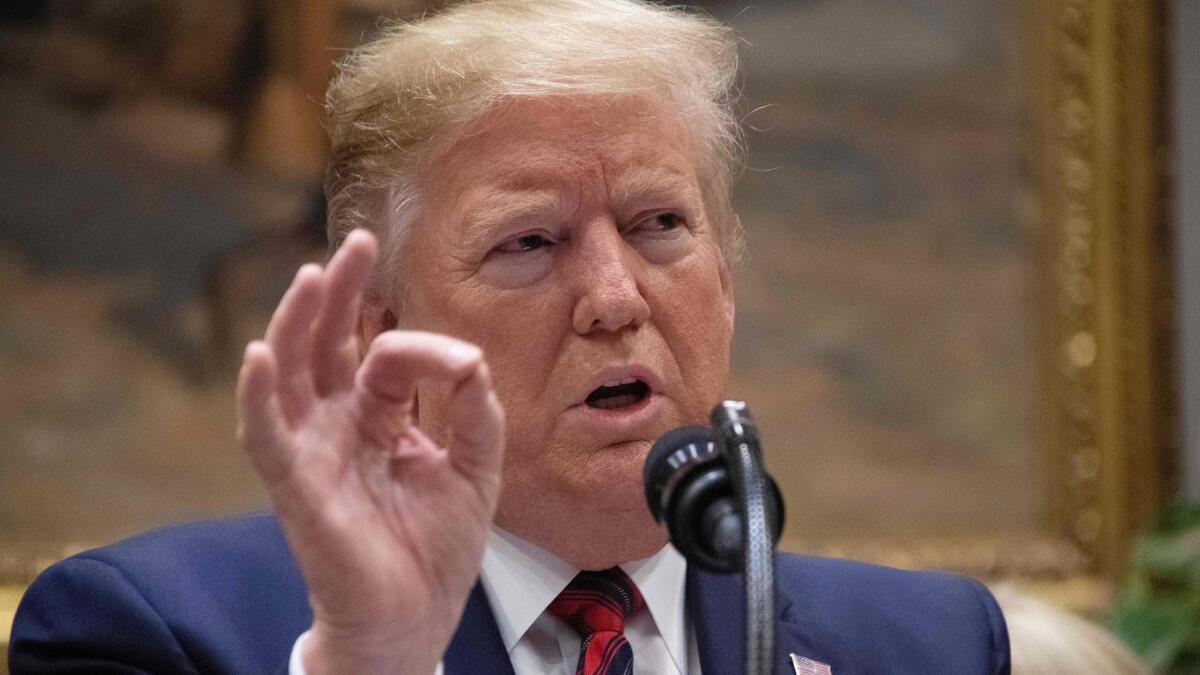China announces tariff hikes on $60 billion of U.S. imports in retaliation for Trump’s trade penalties

- Share via
Deepening a trade battle and sending financial markets into a tailspin, China announced Monday it was raising tariffs on $60 billion of U.S. goods in retaliation for the latest hike in U.S. tariffs on its exports.
The Finance Ministry said Monday the new penalty duties of 5% to 25% on hundreds of U.S. products including batteries, spinach and coffee will take effect June 1.
That followed Trump’s increase on Friday of duties on $200 billion of Chinese imports from 10% to 25% after charging that China had backtracked on commitments it made in earlier negotiations in a dispute over Beijing’s technology ambitions and perennial trade surplus.
Resuming his messages over Twitter early Monday, President Trump warned Chinese President Xi Jinping that China “will be hurt very badly” if it doesn’t agree to a trade deal.
Trump tweeted China “had a great deal, almost completed, & you backed out!”
Trump insisted the tariffs the U.S. has placed on Chinese goods don’t hurt American consumers, saying there is “no reason for the U.S. Consumer to pay the Tariffs.”
White House economic advisor Larry Kudlow acknowledged Sunday that U.S. consumers and businesses pay the tariffs. “Both sides will pay,” he told Fox News.
China had vowed “necessary countermeasures” on Friday against Trump’s escalation of the tariff conflict.
Beijing is running out of U.S. imports for penalties due to the lopsided trade balance between the world’s two largest economies. Regulators have targeted American companies in China by slowing down customs clearance for shipments and processing of business licenses.
The new tariffs are likely to hurt exporters on both sides, as well as European and Asian companies that trade between the United States and China or supply components and raw materials to their manufacturers.
The increases already in place have disrupted trade in goods from soybeans to medical equipment and sent shock waves through other Asian economies that supply Chinese factories.
Forecasters have warned that the U.S. tariff hikes could disrupt a Chinese recovery that had appeared to be gaining traction. Growth in the world’s second-largest economy held steady at 6.4% over a year earlier in January-March, supported by higher government spending and bank lending.
The tensions “raise fresh doubts about this recovery path,” Morgan Stanley economists Robin Xing, Jenny Zheng and Zhipeng Cai said in a report.
The latest U.S. charges could knock 0.5 percentage points off annual Chinese economic growth and that loss could widen to 1 percentage point if both sides extend penalties to all of each other’s exports, economists say. That would pull annual growth below 6%, raising the risk of politically dangerous job losses.
The latest talks ended with no word of progress on Friday.
Trump might meet his Chinese counterpart, Xi Jinping, during next month’s meeting of the Group of 20 major economies in Osaka, Japan, Kudlow said.
Chinese officials have invited the top U.S. envoys -- U.S. Trade Representative Robert Lighthizer and Treasury Secretary Steven T. Mnuchin — to Beijing, Kudlow said on Fox News. But he said there were no “definite plans.”
Trump started raising tariffs in July over complaints China steals or pressures companies to hand over technology.
Washington wants Beijing to roll back government support for Chinese companies striving to become global leaders in robotics and other technology. The U.S. and other trading partners say such efforts violate Beijing’s free-trade commitments.
A stumbling block has been U.S. insistence on an enforcement mechanism with penalties to ensure Beijing carries out its commitments. Economists say Chinese leaders probably reject that as a violation of Chinese sovereignty.
More to Read
Inside the business of entertainment
The Wide Shot brings you news, analysis and insights on everything from streaming wars to production — and what it all means for the future.
You may occasionally receive promotional content from the Los Angeles Times.










